
The Enchanting Charm of Dishan Kala, Khiva
Dishan Kala, the outer city of Khiva, is an enthralling blend of ancient history and vibrant culture. This neighbourhood is the less-touristed counterpart to the inner city, Itchan Kala, offering a more authentic and immersive experience of local life. Walking through its narrow streets, you will encounter traditional mud-brick houses, bustling markets, and the warm hospitality of the locals. Dishan Kala is surrounded by a crumbling but evocative outer wall, reminding visitors of its historical significance as a protective barrier. The neighbourhood is known for its labyrinthine layout, which is a delight for those who enjoy exploring off the beaten path. Here, you will find hidden gems such as small mosques, historic madrassas, and artisan workshops where craftsmen continue to practice age-old techniques. A visit to Dishan Kala is not complete without sampling the local cuisine. Small eateries and family-run teahouses offer a taste of Uzbek delicacies, from plov to samsa. The atmosphere is always lively, whether it's a local festival or just an ordinary day. Dishan Kala provides a unique opportunity to soak in the daily rhythms and traditions of Khiva's residents, making it a must-visit for any traveler seeking a deeper connection with Uzbekistan's rich heritage.
Local tips in Dishan Kala
- Wear comfortable shoes for walking, as the streets are uneven and can be challenging to navigate.
- Visit early in the morning to avoid the midday heat and enjoy a quieter atmosphere.
- Carry cash, as many local vendors and eateries do not accept credit cards.
- Learn a few basic phrases in Uzbek or Russian to communicate more easily with locals.
- Respect local customs by dressing modestly, especially when visiting religious sites.
The Enchanting Charm of Dishan Kala, Khiva
Dishan Kala, the outer city of Khiva, is an enthralling blend of ancient history and vibrant culture. This neighbourhood is the less-touristed counterpart to the inner city, Itchan Kala, offering a more authentic and immersive experience of local life. Walking through its narrow streets, you will encounter traditional mud-brick houses, bustling markets, and the warm hospitality of the locals. Dishan Kala is surrounded by a crumbling but evocative outer wall, reminding visitors of its historical significance as a protective barrier. The neighbourhood is known for its labyrinthine layout, which is a delight for those who enjoy exploring off the beaten path. Here, you will find hidden gems such as small mosques, historic madrassas, and artisan workshops where craftsmen continue to practice age-old techniques. A visit to Dishan Kala is not complete without sampling the local cuisine. Small eateries and family-run teahouses offer a taste of Uzbek delicacies, from plov to samsa. The atmosphere is always lively, whether it's a local festival or just an ordinary day. Dishan Kala provides a unique opportunity to soak in the daily rhythms and traditions of Khiva's residents, making it a must-visit for any traveler seeking a deeper connection with Uzbekistan's rich heritage.
Iconic landmarks you can’t miss
Itchan Kala
Discover the rich history and stunning architecture of Itchan Kala, a UNESCO World Heritage site in Khiva, Uzbekistan, a true jewel of the Silk Road.
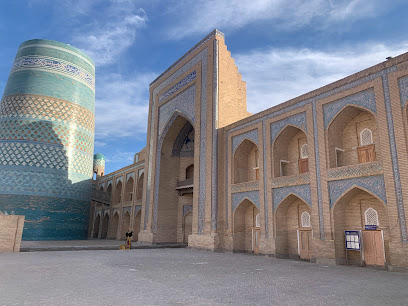
Kalta Minor Minaret
Discover the breathtaking Kalta Minor Minaret in Khiva, a stunning historical landmark showcasing exquisite Islamic architecture and rich cultural heritage.
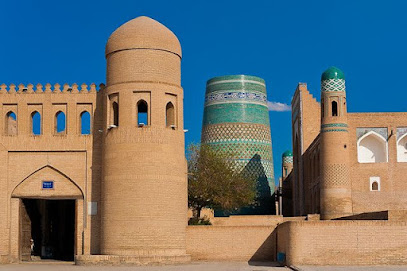
Toshhovli Palace
Explore the stunning Toshhovli Palace in Khiva, a historical gem showcasing the opulence of the Khivan khans amid beautiful gardens and intricate architecture.
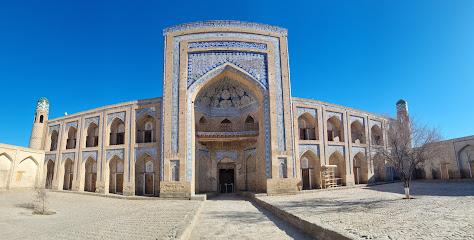
Kuhna Ark
Discover the magnificent Kuhna Ark in Khiva, a museum showcasing the rich history and culture of Uzbekistan's Khivan Khanate.
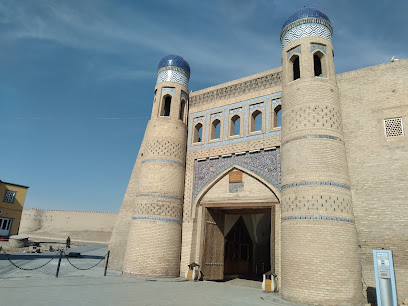
Itchan Kala west gate
Explore the stunning architecture and rich history of Itchan Kala, the west gate of Khiva, a UNESCO World Heritage site in Uzbekistan.
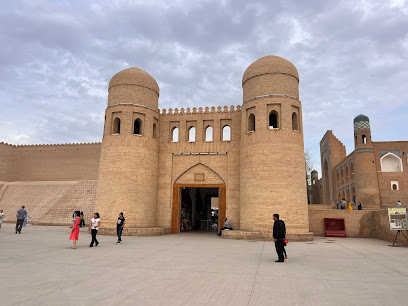
Nurullaboy Palace
Explore the grandeur of Nurullaboy Palace, a historical gem in Khiva, Uzbekistan, showcasing stunning architecture and rich cultural heritage.
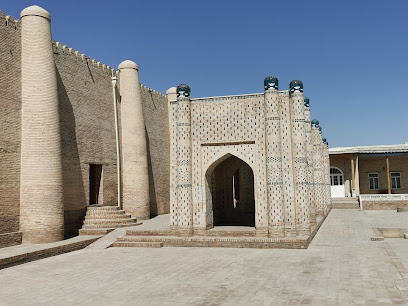
Allakuli Khan Madrassah
Immerse yourself in the rich history and stunning architecture of Allakuli Khan Madrassah in Khiva, a must-visit tourist attraction in Uzbekistan.
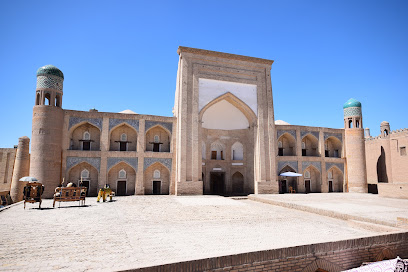
Khiva Ichan Kala
Explore Ichan Kala, a UNESCO World Heritage Site in Khiva, Uzbekistan, where history, culture, and breathtaking architecture await every traveler.
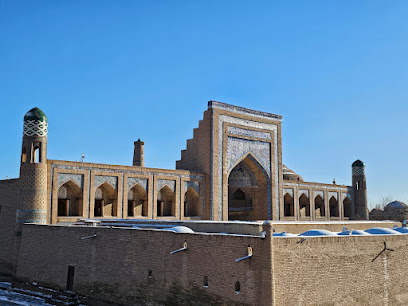
Stone Gate (Itchan Kala South Gate)
Discover the enchanting Stone Gate of Itchan Kala in Khiva, Uzbekistan, a stunning blend of history and culture that beckons travelers to explore its rich heritage.
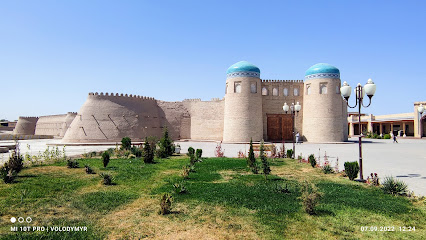
Outer City Wall
Discover the historical marvels of Khiva at the Outer City Wall, a UNESCO World Heritage site that embodies the rich heritage of Uzbekistan.
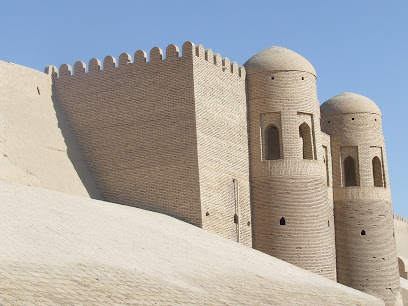
Unmissable attractions to see
Kalta Minor Minaret
Discover the breathtaking Kalta Minor Minaret, a stunning architectural marvel and a symbol of Khiva's rich heritage in Uzbekistan.
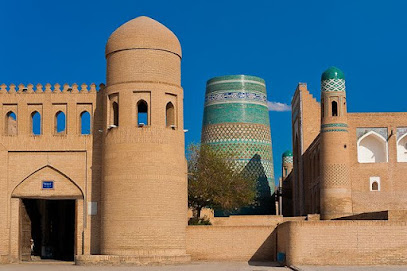
Toshhovli Palace
Explore Toshhovli Palace, a historical landmark in Khiva, Uzbekistan, showcasing stunning architecture and rich cultural heritage.
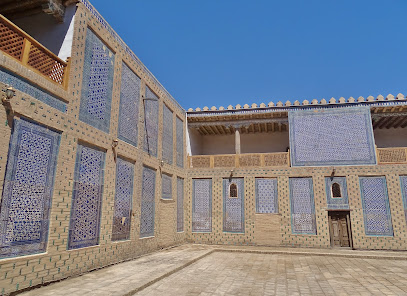
Kuhna Ark
Explore Kuhna Ark, an ancient fortress museum in Khiva, and uncover the rich history and culture of Uzbekistan's Khorezm region.
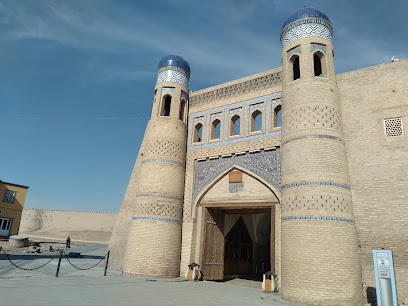
Nurullaboy Palace
Discover the opulent Nurullaboy Palace in Khiva, a historical gem showcasing the grandeur of Uzbekistan's cultural heritage.
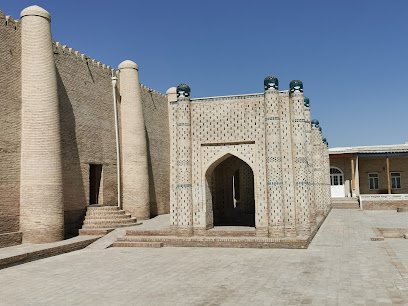
Allakuli Khan Madrassah
Discover the architectural beauty and historical significance of Allakuli Khan Madrassah in Khiva, a must-visit landmark in Uzbekistan's rich cultural landscape.
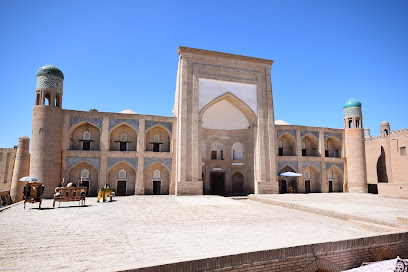
Essential places to dine
Terrassa Cafe & Restaurant
Experience delightful dining at Terrassa Cafe & Restaurant with stunning views over Ichan Kala in historic Khiva.
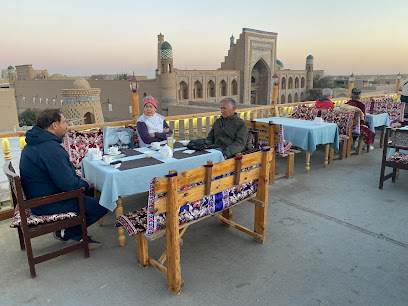
Khiva Moon
Experience authentic Uzbek cuisine at Khiva Moon – where tradition meets taste in a charming setting.
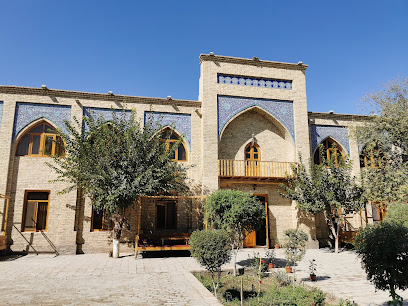
Tea House Bir Gumbaz
Experience authentic Uzbek cuisine and aromatic teas at Tea House Bir Gumbaz in Khiva's historic heart.
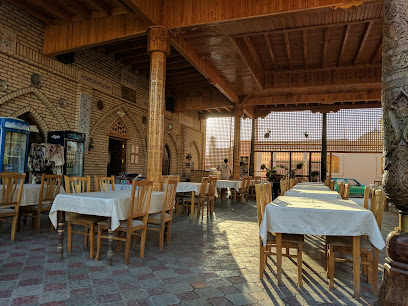
Cafe Zarafshon
Discover authentic Uzbek cuisine at Cafe Zarafshon in Khiva – where tradition meets taste in a charming setting.
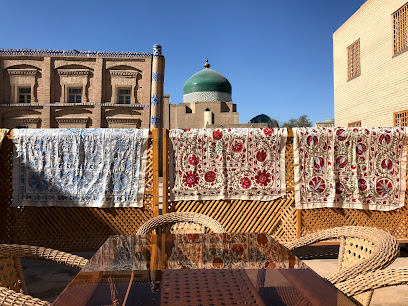
Tea house Mirza Boshi
Experience the authentic taste of Uzbekistan at Tea House Mirza Boshi in Khiva - a serene spot for tea lovers and cultural enthusiasts.
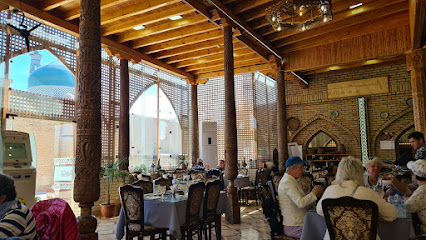
Sofra Restaurant
Experience the best steaks in Khiva at Sofra Restaurant, where tradition meets taste in every bite.
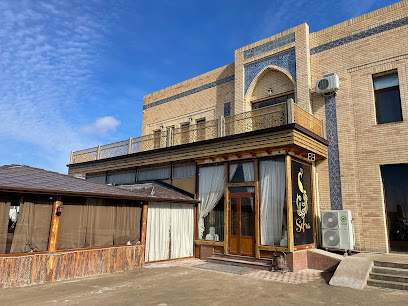
Yasavul Boshi Restaurant
Discover authentic Uzbek cuisine at Yasavul Boshi Restaurant in Khiva - where tradition meets taste.
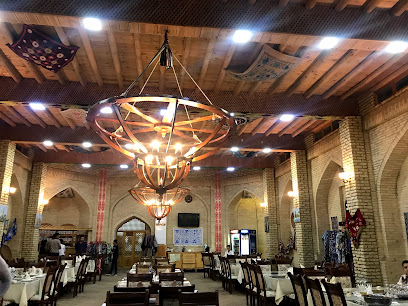
Restaurant Xiva Kafe Milliy taomlar and Central park hostel
Discover authentic Uzbek flavors at Restaurant Xiva Kafe Milliy Taomlar in historic Khiva - where tradition meets taste.
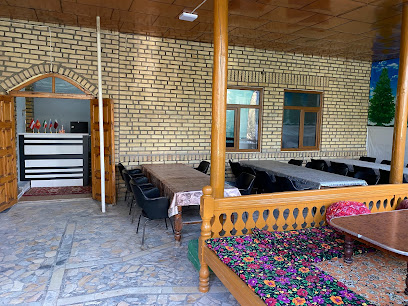
Caravan Khiva Restaurant
Experience authentic Uzbek cuisine at Caravan Khiva Restaurant in the heart of historic Khiva, offering delightful dishes and warm hospitality.
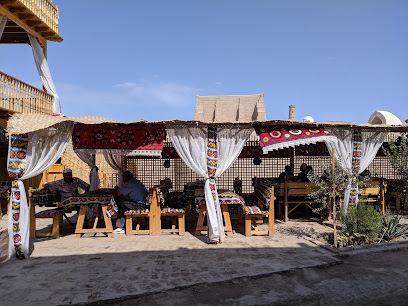
#RUSLANCAFE (Resto & Lounge)
Discover #RUSLANCAFE: A cozy bar in Khiva offering local drinks & snacks amidst stunning Uzbek culture.
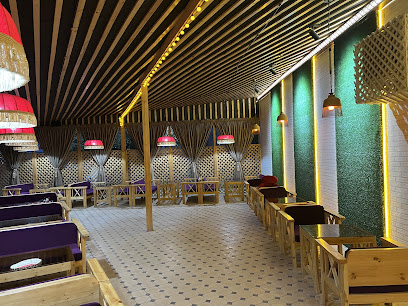
Markets, malls and hidden boutiques
Itchan Kala
Explore Itchan Kala, a UNESCO World Heritage site in Khiva, Uzbekistan, steeped in history and adorned with stunning Islamic architecture.
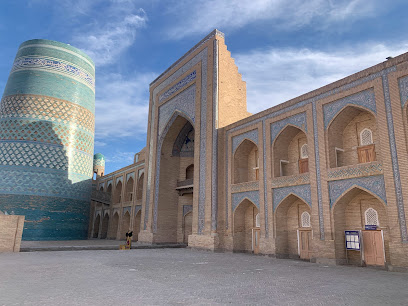
Kuhna Ark
Explore Kuhna Ark: A Historic Fortress and Museum Showcasing the Rich Heritage of Khiva, Uzbekistan.
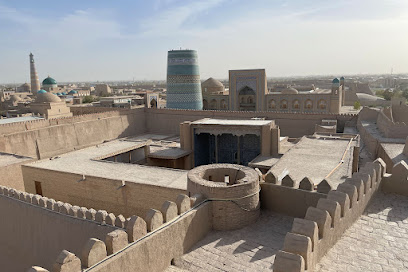
Khiva Ichan Kala
Explore the enchanting streets of Khiva Ichan Kala, where history, culture, and stunning architecture come together in a breathtaking journey.
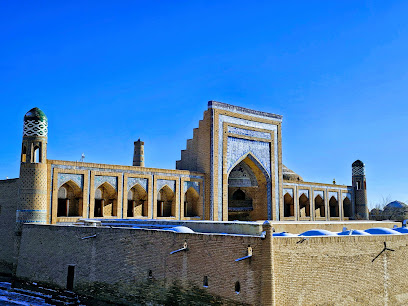
Palvan Darvoza
Discover the enchanting Palvan Darvoza, a historical gateway to Khiva, where rich culture and stunning architecture await your exploration.
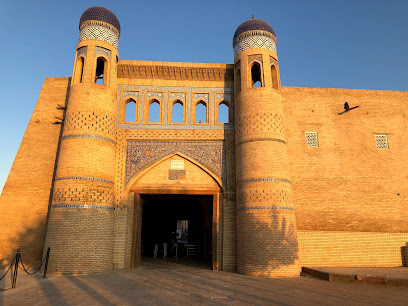
Khiva Bazaar
Explore Khiva Bazaar, a colorful marketplace in Uzbekistan brimming with fresh produce, local delicacies, and handcrafted treasures.
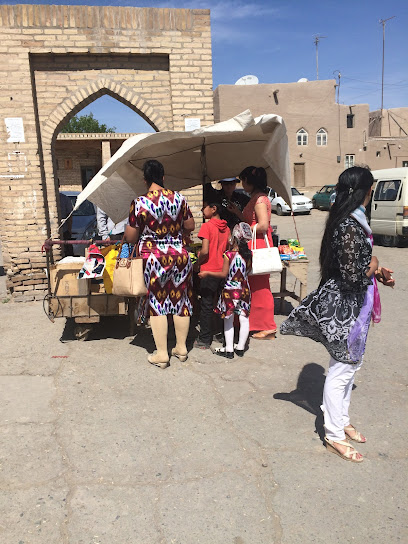
Local Phrases
-
- HelloСалом
[Salom] - GoodbyeХайр
[Hayr] - YesҲа
[Ha] - NoЙўқ
[Yoʻq] - Please/You're welcomeИшончингиз учун
[Ishonchingiz uchun] - Thank youРаҳмат
[Rahmat] - Excuse me/SorryУзр
[Uzr] - How are you?Нимасиз?
[Nimasiz?] - Fine. And you?Жуда хучрайман. Сиз?
[Juda huchrayman. Siz?] - Do you speak English?Инглизча сўзлайсизми?
[Ingilizcha so'zlaysizmi?] - I don't understandМени тушунмадим
[Meni tushunmadim]
- HelloСалом
-
- I'd like to see the menu, pleaseМенюни кўришни истайман, илтимос
[Menyuni ko'rishni istayman, iltimos] - I don't eat meatМен гўсht йемайман
[Men go'sht yemayman] - Cheers!Сайёҳлар билан!
[Sayyohlar bilan!] - I would like to pay, pleaseТўловни истайман, илтимос
[Tolovni istayman, iltimos]
- I'd like to see the menu, pleaseМенюни кўришни истайман, илтимос
-
- Help!Ёрдам!
[Yordam!] - Go away!Ётинг!
[Yoting!] - Call the Police!Полицияни чақиринг!
[Politsiyani chaqiring!] - Call a doctor!Докторни чақиринг!
[Doktorni chaqiring!] - I'm lostМен қайсиман
[Men qaysiman] - I'm illМен касалман
[Men kasalman]
- Help!Ёрдам!
-
- I'd like to buy...Сотиб олишни истайман...
[Sotib olishni istayman...] - I'm just lookingФақат кўриб чиқармоқдаман
[Faqat ko'rib chiqarmoqdaman] - How much is it?Бу қанча?
[Bu qancha?] - That's too expensiveБу жуда қиммат
[Bu juda qimmat] - Can you lower the price?Нархни тўғрийапсизми?
[Narxni to'g'riyapsizmi?]
- I'd like to buy...Сотиб олишни истайман...
-
- What time is it?Соат қандай?
[Soat qanday?] - It's one o'clockБир соат
[Bir soat] - Half past (10)Оннинг орти
[Onning orti] - MorningТун
[Tun] - AfternoonКеча
[Kecha] - EveningКеч
[Kech] - YesterdayКеча
[Kecha] - TodayБугун
[Bugun] - TomorrowЭртага
[Ertaga] - 1Бир
[Bir] - 2Икки
[Ikki] - 3Уч
[Uch] - 4Тўрт
[To'rt] - 5Беш
[Besh] - 6Олтө
[Oltö] - 7Еттө
[Ettö] - 8Саккиз
[Sakkiz] - 9Тўққиз
[To'qqiz] - 10Он
[On]
- What time is it?Соат қандай?
-
- Where's a/the...?Бир...
[Bir...] - What's the address?Манзили қандай?
[Manzili qanday?] - Can you show me (on the map)?Харитада кўрсатингизми?
[Xaritada korsatingizmi?] - When's the next (bus)?Кейинги (автобус) қачон?
[Keyingi (avtobus) qachon?] - A ticket (to ....)Билет (... га)
[Bilet (... ga)]
- Where's a/the...?Бир...
History of Dishan Kala
-
Dishan Kala, which translates to 'Outer Fortress', was established in the early 19th century as a defensive structure surrounding the older Itchan Kala, or 'Inner Fortress'. This expansion was crucial for the protection of Khiva from external threats, particularly during the turbulent times of invasions and power struggles in Central Asia.
-
Throughout the 19th century, Dishan Kala became a hub for architectural innovation, showcasing a blend of Persian and Turkic styles. Structures such as the Tash Khauli Palace were built during this period, highlighting the aesthetic and functional aspects of the neighborhood's design. The intricate tile work and monumental gates are testaments to the craftsmanship of Khiva's artisans.
-
Dishan Kala has historically served as a cultural melting pot, where various ethnic groups and traders converged. The neighborhood's bazaars were lively centers of commerce, where goods from across the Silk Road were exchanged. This interaction fostered a rich tapestry of cultural influences, evident in the neighborhood's traditions, cuisine, and festivals.
-
In the late 19th century, with the arrival of Russian influence in Central Asia, Dishan Kala experienced significant changes. The Russian Empire's interest in the region led to modernization efforts, including the introduction of new infrastructure and urban planning concepts. These changes, while sometimes at odds with local traditions, ultimately contributed to the evolution of the neighborhood.
-
Following independence from the Soviet Union in 1991, Dishan Kala faced challenges related to urban decay and the need for preservation. However, recent efforts have focused on restoring its historical architecture and promoting tourism. The neighborhood is now recognized as a UNESCO World Heritage Site, emphasizing its importance in preserving the cultural heritage of Khiva and Central Asia.
Dishan Kala Essentials
-
Dishan Kala is accessible from other neighborhoods in Khiva, primarily from Ichon Kala, which is the main tourist area. You can easily walk between the two neighborhoods, as they are adjacent to each other. If you are coming from the Khiva bus station, local taxis are available for hire, typically costing around 10,000 UZS. Alternatively, you can take a horse-drawn carriage (drawn by 'araba') for a unique experience, though it may be pricier.
-
Dishan Kala is best explored on foot due to its compact size and pedestrian-friendly alleys. Bicycles are also available for rent in Khiva, allowing for a leisurely exploration of the area. Local taxis can be flagged down if you wish to travel farther afield. However, public transportation options like buses are limited within the neighborhood itself.
-
Dishan Kala is generally a safe neighborhood for tourists. However, like in any tourist destination, standard precautions should be taken. Avoid walking alone late at night in less populated areas. Pay special attention to your belongings in crowded places, especially near popular tourist sites. While there are no specific high-crime areas in Dishan Kala, it is advisable to stay aware of your surroundings.
-
In case of emergency, dial 103 for medical assistance and 102 for police. The nearest hospital is located in the Ichon Kala area. It is advisable to have travel insurance that covers health emergencies. For minor issues, there are several pharmacies in the vicinity where you can find basic medications.
-
Fashion: Do dress modestly, especially when visiting mosques or other religious sites. Avoid revealing clothing. Religion: Do be respectful of local customs and traditions. Always remove your shoes when entering a mosque. Public Transport: Do give up your seat to elderly passengers if using a taxi. Don’t eat or drink in public transport. Greetings: Do greet locals with a warm smile and a handshake. Eating & Drinking: Do try local dishes and accept food offers graciously. Don’t refuse hospitality, as it is considered impolite.
-
To experience Dishan Kala like a local, visit the artisan workshops where you can see traditional crafts being made, such as pottery and carpet weaving. Engage with locals, many of whom are eager to share stories about their crafts and heritage. Don’t miss the local bazaars for authentic souvenirs. Additionally, try to learn a few phrases in Uzbek; locals appreciate when tourists make an effort to communicate in their language.
-
When visiting Dishan Kala, be mindful of cultural norms. Always greet people politely and maintain a respectful demeanor, especially in religious settings. Photography is generally permitted, but always ask for permission when taking pictures of people, particularly women. Additionally, during the holy month of Ramadan, be respectful of fasting practices, particularly in public spaces.
Nearby Cities to Dishan Kala
-
Things To Do in Urgench
-
Things To Do in Bukhara
-
Things To Do in Ashgabat
-
Things To Do in Mary
-
Things To Do in Navoi
-
Things To Do in Bayramaly
-
Things To Do in Qarshi
-
Things To Do in Samarkand
-
Things To Do in Shakhrisabz
-
Things To Do in Panjakent
-
Things To Do in Djizak
-
Things To Do in Jizzakh
-
Things To Do in Turkestan
-
Things To Do in Tursunzoda
-
Things To Do in Tashkent










